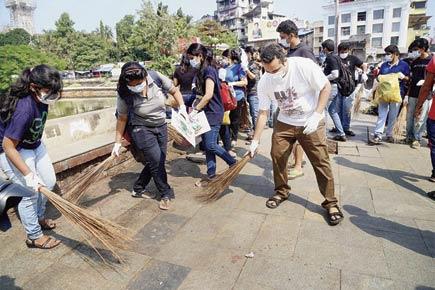Last weekend I was in Ranchi, a small, uncluttered Chota Nagpur town that has transmogrified into the overpopulated, cluttered and noisy capital city of Jharkhand. Ranchi was and remains a one-street town-turned-city

 Last weekend I was in Ranchi, a small, uncluttered Chota Nagpur town that has transmogrified into the overpopulated, cluttered and noisy capital city of Jharkhand. Ranchi was and remains a one-street town-turned-city. Negotiating the chaotic traffic is a nightmare. There is nothing melodious about the cacophony of sounds that greets untrained ears.
Last weekend I was in Ranchi, a small, uncluttered Chota Nagpur town that has transmogrified into the overpopulated, cluttered and noisy capital city of Jharkhand. Ranchi was and remains a one-street town-turned-city. Negotiating the chaotic traffic is a nightmare. There is nothing melodious about the cacophony of sounds that greets untrained ears.
In its heyday, Ranchi was dotted with sprawling bungalows with tiled roofs and fashionable old-style houses with gardens. There were well laid out colonies for the staff of public sector units and colliery offices. Firayalal, a tacky department store of sorts, was possibly the only landmark in an otherwise staid town.
ADVERTISEMENT

The intention behind grand programmes like Clean India is no doubt admirable and laudable. But it is equally important that the reality of India be factored in if some success is to be achieved in implementing these programmes. Pic/PTI
Today Ranchi is crowded with ugly apartment blocks that have sprung up like so many mushrooms in the wild, often leaning into each other. Most, if not all, the old houses are gone. The few bungalows that remain serve as the residences of senior officials.
Firayalal remains where it was (at Firayalal Chowk) but the descendants of its once loyal customers (as also the new immigrants) now shop at the chrome-and-glass malls that line the crowded main street and side roads. Despite the construction boom, Ranchi wears a shabby look. Sadly, there’s nothing genteel about the shabbiness.
In open spaces, a malodour hangs heavy in the air as drains lining the roads carry the city’s human waste and garbage festers on what were meant to be pavements. The only neat and clean places are those outside the bungalows of government officials.
Ranchi, in a sense, exemplifies how urban planning in India has gone horribly wrong. So long as palms are greased, every infringement of the law is overlooked. Venal politicians, corrupt bureaucrats and the builders’ mafia have colluded to ensure that what could have been a planned, modern, smart city has turned out to be a hideous urban slum.
It would be unfair to suggest that Ranchi alone enjoys this dubious distinction. What were once referred to as ‘Tier 2’ cities are equally grotesque caricatures of what they were meant to be. Many of our state capitals are no different. The sight that greets your eyes is far from pleasing.
The filth and squalor make the landscape appear more grim than it would have, had there been a modicum of cleanliness. And this is where the reason I am writing about Ranchi comes in.
A fortnight after Prime Minister Narendra Modi launched his ambitious Swachh Bharat or Clean India project, Ranchi appeared blissfully unaware of it. Even if this were not true, nobody seemed to be particularly bothered, least of all the authorities. The garbage did not seem to be of recent vintage.
In fact, there were no visible signs of a start having been made to clean up Ranchi. The story cannot be radically different in cities across the country. This reality tells us of the obstacles that have to be surmounted to make India even marginally cleaner than what it is: in large measures, a fetid swamp and a cesspool, if not literally, then metaphorically.
The intention behind grand programmes like Clean India is no doubt admirable and laudable. But it is equally important that the reality of India be factored in if some success is to be achieved in implementing these programmes. Flashy brand ambassadors are fine, but they contribute nothing.
Here are three things that are mandatory if the goal of Clean India is to be achieved in our lifetime. First, states have to be taken on board and given absolute, inelastic deadlines. Incentives do not work in India; disincentives do. Second, municipality laws have to be severely amended to make both corporators and babus more accountable. Punishment for failure has to be exemplary. Third, the idea of cleanliness has to be drilled into our children by making it an important part of school curriculum.
People should be held accountable too. Given our population size, it would be silly to propose fining individuals who dirty our cities and litter our roads. A far better option would be to impose collective fines: make everybody pay for not stopping some of the people who have no concern for cleanliness.
A last point that merits mention is about urban waste management. We have cities but we do not have systems to deal with the waste produced by the residents of these cities. Decrepit systems that exist are either woefully inadequate or inactive.
No campaign to make India clean will succeed without addressing this and the other issues. We would, at best, have created yet another annual ritual.
Surely India deserves better?
The writer is a senior journalist based in the National Capital Region. His Twitter handle is @KanchanGupta
 Subscribe today by clicking the link and stay updated with the latest news!" Click here!
Subscribe today by clicking the link and stay updated with the latest news!" Click here!







